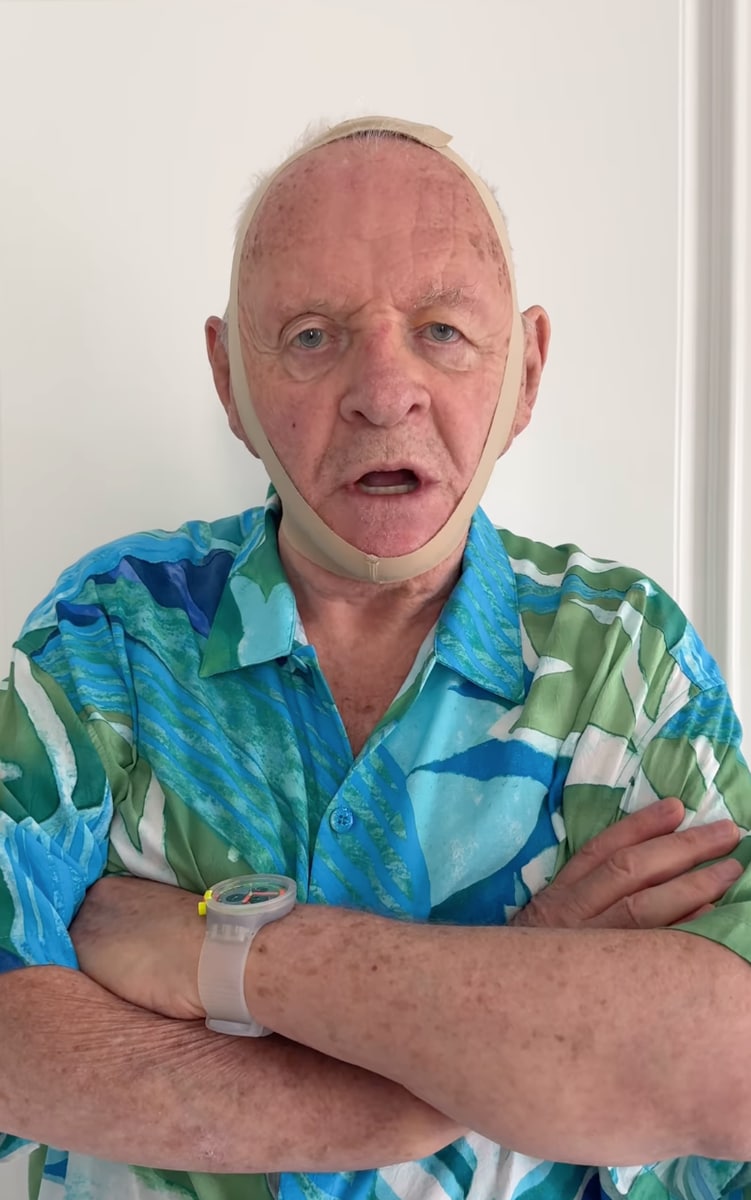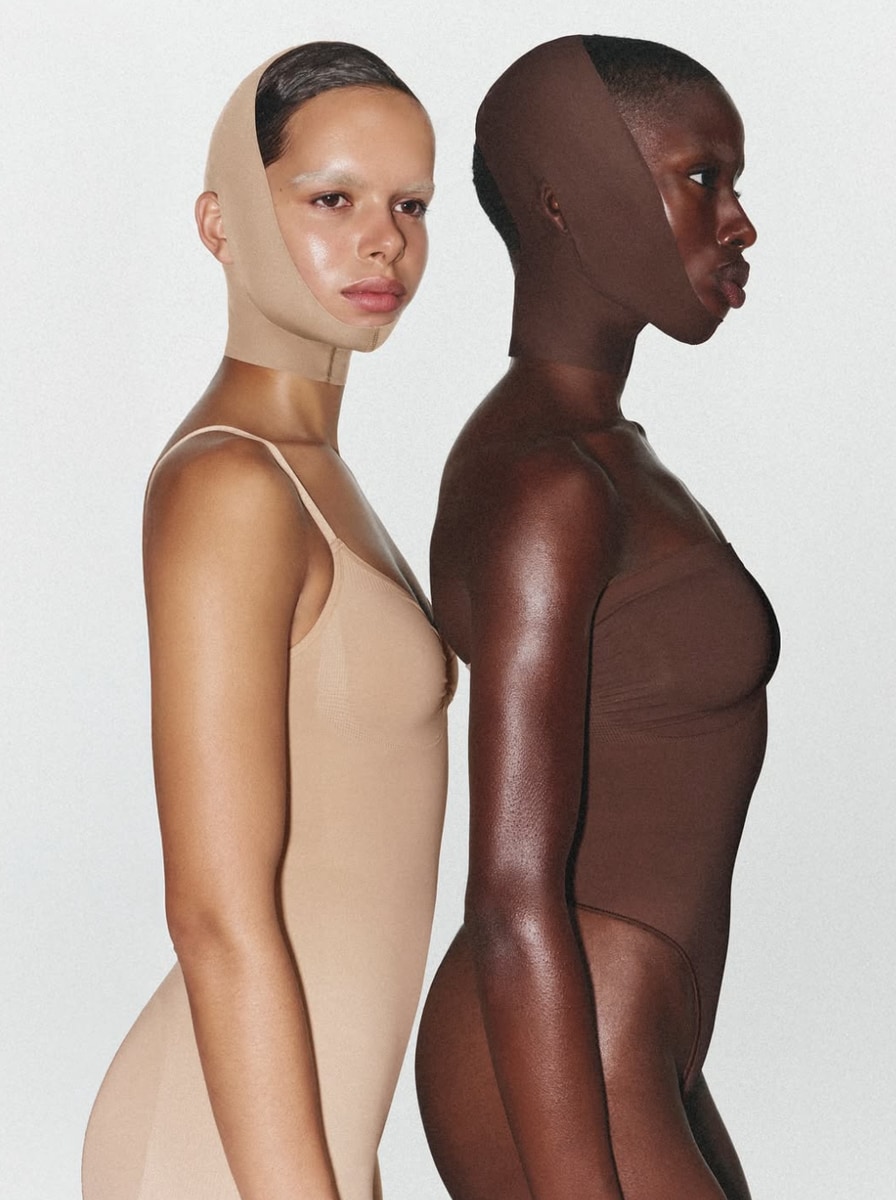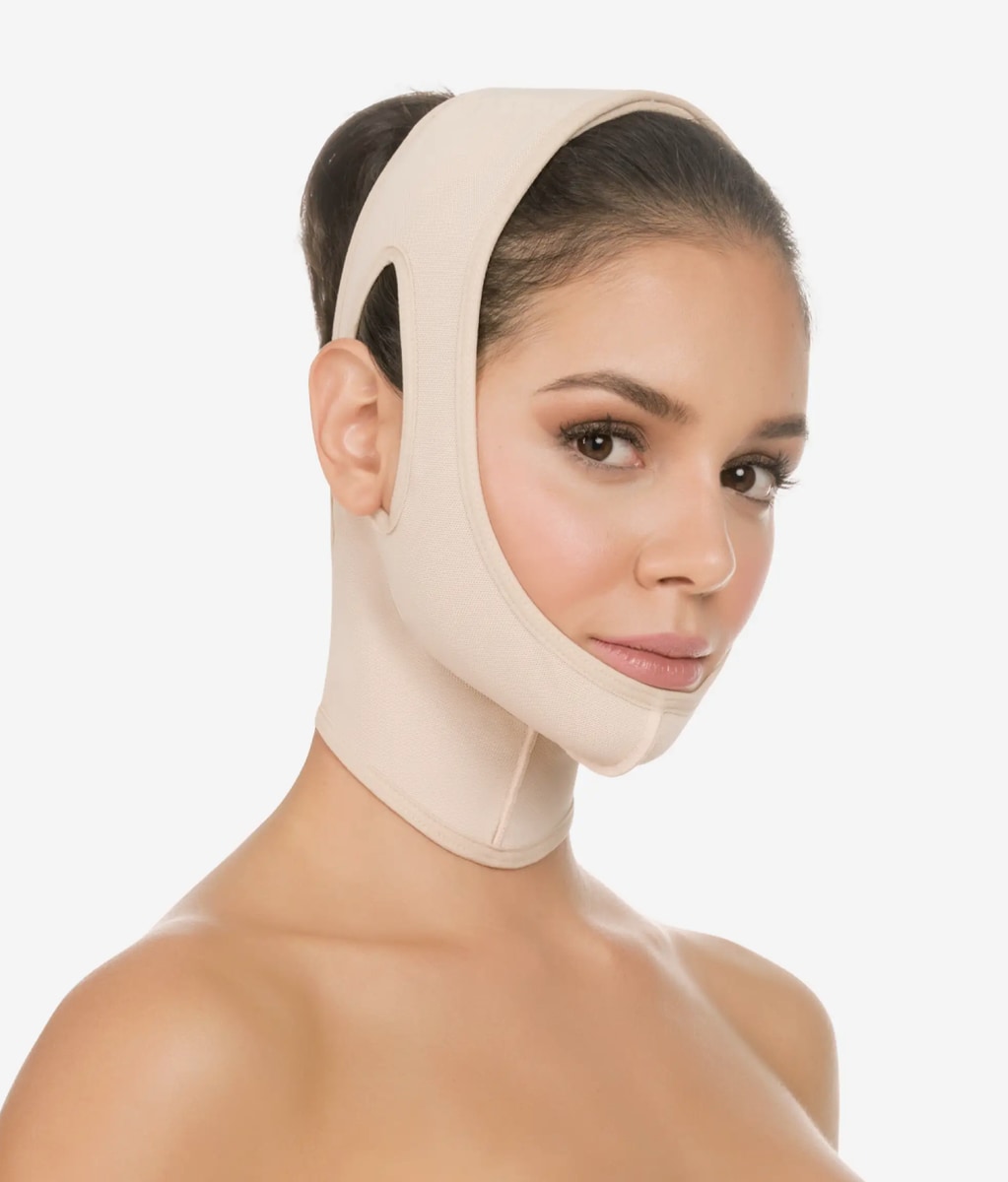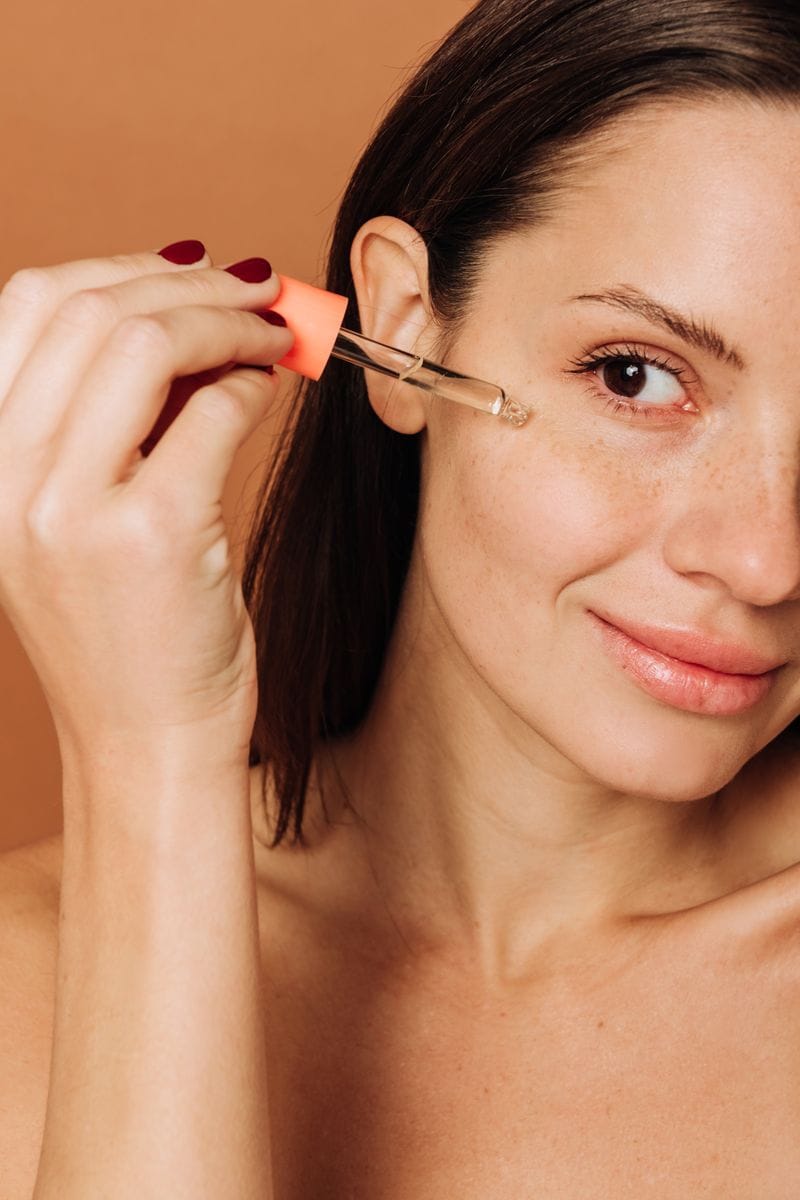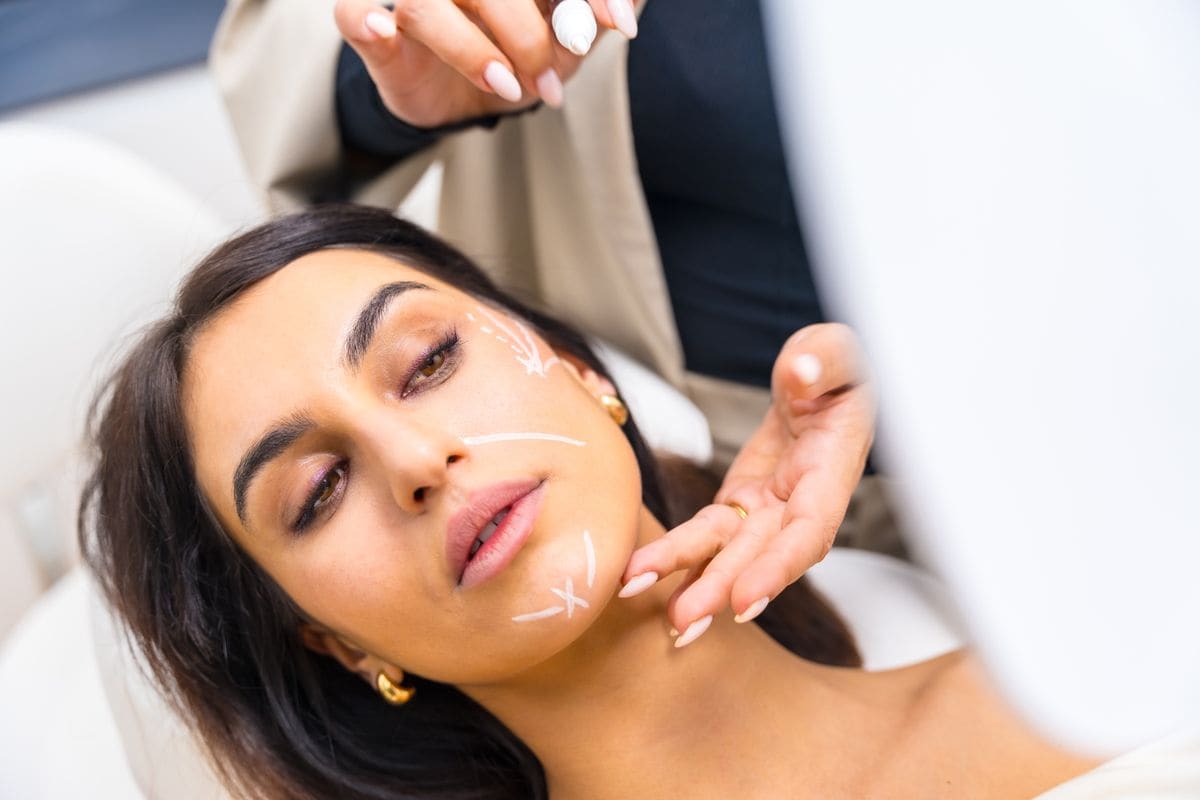If you've spent any time scrolling through beauty TikToks or Instagram Reels lately, chances are you've seen someone strapping on a tight face wrap promising a snatched jawline, lifted cheeks, or even a slimmer face, all without setting foot into a clinic. Dubbed "face shapewear," these stretchy compression bands have gone viral with bold before-and-after claims, often featuring influencers boasting overnight transformations.
People are so intrigued by the topic that even the legendary Anthony Hopkins revisited his iconic Hannibal Lecter role from "The Silence of the Lambs," poking fun at Kim Kardashian, who recently launched a compression garment designed to shape and sculpt. Social media users have since compared the beige face wrap to Lecter's famous mask.
All jokes aside, many wonder if any science is behind the hype. We spoke to top facial experts to get the absolute, unfiltered truth about whether face shapewear works and whether those temporary lifts are doing more harm than good. Spoiler alert: the answers are pretty unanimous, and the short-term glow-up might come with hidden downsides.
From dermatologists to facial plastic surgeons, each expert interviewed for HOLA! agrees on one central point: face shapewear isn't delivering the long-term sculpting results that social media often implies. In fact, several stress that it's more of a cosmetic placebo than an accurate contouring tool.
So, What Is Face Shapewear?
"Face shapewear usually refers to compression wraps or masks that claim to lift or sculpt the face," explains Dr. Dendy Engelman, Board-Certified Dermatologist at Shafer Clinic Fifth Avenue. "When people say it 'works,' they're typically seeing a temporary reduction in puffiness or slight tightening from fluid redistribution. It's not actually reshaping the structure of your face."
That's the key word—temporary. According to Dr. Engelman, the visible effects may last only a few hours at best. "You might see short-term effects like de-puffing or a more defined jawline right after wearing it, but these effects typically fade quickly."
No Science, No Long-Term Results
Dr. Ducu, Aesthetic Doctor and founder of Dr. Ducu Clinics, agrees. "There is no robust clinical evidence supporting the long-term efficacy of face shapewear. Most of what we see online is driven by influencer content and subjective results that are difficult to measure scientifically."
Even when worn consistently, the results don't improve over time. "To maintain any visible effect, you'd need to wear it daily—and even then, any improvement is likely to fade within hours," Dr. Ducu says. "Unlike clinically backed treatments, the results don't build."
And while it may seem harmless, these tight wraps can actually backfire. "Overuse of these devices can potentially irritate the skin, especially if they apply too much pressure," he adds. "There's also a risk of affecting lymphatic drainage or causing jaw discomfort."
The Medical Take: 'Don't Waste Your Money'
Facial plastic surgeon Dr. Anil Shah, known for his expertise in face and neck procedures, didn't mince words: "There really are no benefits to wearing these products if you haven't had surgery. Any perceived benefit might last a few minutes, it's not going to make any long-term structural changes."
Post-op compression garments play a specific, functional role in reducing swelling in a clinical setting. But for everyday wear, Dr. Shah says it's a gimmick. "Sleeping in it won't do anything. You might weaken the muscles of the neck, like the platysma. Don't waste your money on this one."
He also raises health concerns: "Yes, you can develop an allergy to the material, or even experience a choking sensation or reflux. These products aren't medically designed or regulated for cosmetic contouring."
The Illusion of a Lift
Dr. Ari Hoschander, a board-certified facial plastic surgeon based in New York, compares face shapewear to a padded bra: it may look good in the moment, but the second you take it off, the illusion disappears. "It's essentially a compression garment, like the ones used after facelifts or neck liposuction. But unless you've had surgery, the most it might do is give a fleeting sense of contour while it's being worn."
He stresses that these wraps are no match for proven treatments. "There's no evidence that this type of garment will sculpt the jawline or deliver any lasting cosmetic benefit. If you're looking for firming, you're better off investing in a good retinol."
What Does Work?
So, if you're chasing that snatched, sculpted look, what's worth your time and money? All the experts point to non-invasive treatments like radiofrequency (RF) and microcurrent therapy.
"Facial massage and exercises can help mildly with circulation and tone, but they're not substitutes for clinical-grade treatments," says Dr. Engelman. "Devices like EVERESSE use RF energy to firm and lift the skin from within, delivering lasting, visible results."
Dr. Ducu echoes that: "We offer non-invasive treatments tailored to each patient's goals, with proven, long-term benefits. Always consult a qualified practitioner for results that are real—not just trending."
Final Verdict
While face shapewear might offer a fun, fleeting way to reduce puffiness before an event or selfie, experts unanimously agree that it does not do any real lifting, sculpting, or reshaping. Over time, it could potentially irritate your skin, disrupt circulation, or strain facial muscles.
If you want real results, the path forward isn't Lycra, it's science.
Save the wraps for post-surgery recovery or Halloween costumes. Regarding facial contouring, your best bet is evidence-based skincare, lifestyle tweaks, and consulting pros who deal in results, not reels.

